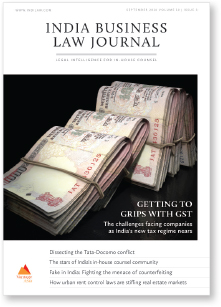India’s performance at the Olympics provides valuable insights
Two medals in total – a silver in badminton and a bronze in wrestling – won by the world’s second most populous country. A fact that has won the attention of commentators both inside and outside India. But for those looking to make sense of the myriad facets of India, the performance at Rio is significant.

Such passion and grit can spur on individual athletes, but a lot more is needed if India is to achieve its potential. Is it ideal that state involvement and support cannot be relied upon, despite the many state engineered hurdles placed before people both in the sportsworld, and beyond? The picture that emerges is one of great challenges for India, albeit many which will present great opportunities.
Meanwhile companies across India are preparing for a challenge of almost Olympic proportions: ensuring they are ready for the introduction of a goods and services tax (GST), which has finally got the all-important nod from parliament. This month’s Cover story details why obtaining credit for GST paid earlier on in the supply chain will be vital. In order to do this not only will a taxpayer’s documents and processes need to be suitably aligned, but those earlier in the supply chain will need to have paid their taxes and filed their returns. Is this asking too much of the smaller suppliers, many of whom have so far been outside the taxman’s net?
While the specifics of GST are not yet available and legal advisers are at best guessing at the details, it would be fair to say that concerns over implementation will not be unfounded. For the reality is that GST “is fiendishly, mindbogglingly complex to administer” as Arvind Subramanian, the government’s chief economic adviser, recently wrote in a national newspaper.
The challenges encountered are similarly fiendish while dealing with the menace of counterfeits and pirated goods, which in India is both complex and deeply entrenched. While such products impact business sales volumes, investments, royalties and brand values, the loss to the exchequer is considerable. In Fake in India we turn the spotlight on the phenomenon, while also delving into how to tackle it.
In Rattled by rent we focus on rent control laws that are holding back the real estate market in urban India. These laws are a legacy of the birth of modern India. They curb the ability of property owners to earn rents in line with market values and are out of place in contemporary India. The courts have repeatedly spoken out against these laws and although an amendment is in the works, given the political sensitivity of the subject, the status quo is likely to continue.
The status quo is likely to continue also with regard to the challenges surrounding the enforceability of arbitral awards in India. In What’s the deal? we use the ongoing dispute between Tata Sons and Docomo over the latter’s stake in Tata Teleservices to analyse the inherent conflict between party autonomy and public policy in international commercial arbitration. The legal position in India has shifted over the years but it appears likely that the case is one where public policy issues trump party autonomy. As such, we argue that it may be time that arbitrators focused on the enforceability of their award and considered relevant public policy in the jurisdiction where the award will be enforced.
Writing in this month’s Vantage point Nikhil Patel, examines the role of trust and cultural perception in the game of negotiation. Patel, who is a legal counsel with experience of working in both Indian and international companies, believes a lot of the gap between Indian and international negotiators is down to simple misunderstanding. What can be done to improve the situation? One study suggests that parties need to be more trusting during negotiations. The result could be higher gains for both Indians and international parties who are involved.
This month’s Intelligence report highlights a recent publication that features many of the leading lights of India’s growing in-house legal community. In a book entitled Trailblazers, the Indian Corporate Counsel Association (ICCA) pays tribute to in-house counsel working across a number of industries. They include 15 women and 82 men based across India and abroad in companies including Snapdeal, Jet Airways, Tata Steel, Lodha Developers and Neyveli Lignite.
Referring to the publication as “a celebration that was long overdue”, Ashok Sharma, founder president of the ICCA, says: “This initiative is our way of honouring in-house lawyers in India since they have never been recognized in the same way that private practice lawyers have.”
By being included in the book, the trailblazers will likely prove to be as inspirational as the two plucky women from India who proved their mettle at the Olympics.



























